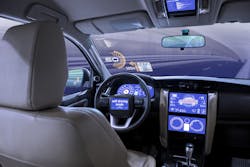Are Driverless Cars a Threat or Benefit to Society?
Driverless cars are the new sensation in both the tech and transport sectors. While the cars themselves may not yet be here with us yet, the debate as to whether they will improve or threaten the future is already well underway. Some stakeholders in the tech industry are optimistic that the new technology will be a major upgrade for today’s transport industry. The transport sector stakeholders, on the other hand, see driverless cars as an unnecessary interference which will threaten the economy and render many jobless.
In this article, we will look at the main areas that autonomous cars are likely to influence, either positively or negatively, and how.
2. Car emissions.
1. Safety
Statistics show that more than a million lives from across the world are lost through road accidents per year. In the U.S., more than $190 billion per year goes toward paying for damages—both in terms of medical fees and damaged property—that arise from road accidents. Further statistics show that about 90% of these accidents have a direct or indirect connection with irresponsible driving. In other words, by getting human drivers off of the roads and replacing them with driverless cars, road carnage could be reduced by up to 90%.
On the flipside, autonomous cars are basically computers—and as it has become the norm these days, the cybercrime threat cannot be wished away. According to Will Godfrey, chief of trends analysis for the U.S. National Highway Traffic Safety Administration, the safety solutions that the driverless cars are likely to bring could be jeopardized by this threat. Criminals can, for example, access a vehicle’s braking system from a remote location, risking the lives of its occupants.
Software failure is another safety concern that people have with respect to driverless cars. These vehicles will be using sensors to read traffic signals, to communicate with technicians from their respective head offices, and even to communicate with each other on the road. What, then, happens when the sensors are destroyed or interfered with by adverse weather conditions? Lives could be on the line in this case, too.
2. Effect on Economy
With the full adoption of driverless cars, there is no doubt that many jobs will be lost in the process: delivery guys, taxi drivers, and basically everyone who depends on driving jobs for a living. This could potentially precipitate a serious unemployment crisis.
On the other hand, autonomous cars bring many benefits to the global economy. First, these cars have the potential of eliminating traffic jams in major cities, thus saving time for the working population. According to digital marketing agency Outsource2EU, “People will get more done within a day than ever before. And secondly, software developers and IT experts are looking at unlimited job opportunities in the future because they will be entrusted with the running of the transport industry.”
3. Working while driving.
3. Health
The transport industry as currently constituted is a health hazard in and of itself. Global carbon emissions are dangerously high today, with statistics showing that these emissions have increased by about 50% over the last 30 years. The environmental and health significance of this can never be underestimated. Reduced traffic, on the other hand, will lead to reduced cases of high blood pressure, reduced noise hearing loss, anxiety, and depression, as well as increased cardiovascular fitness.
4. Cost
The cost of buying and maintaining a car today is just a small fraction of what driverless cars are going to demand. The cost of buying the software, installing sensors, and updating them every now and then could be too much to bear.
The full potential of autonomous cars is yet to be tested, so we may not be able to authoritatively tell how it will threaten or benefit our future society. Without taking anything from the human drivers, however, it is clear that this new technology will precipitate many benefits to the global economy and the health sector. In the meantime, driverless car manufacturers can continue to sort out the above concerns to curb the public’s skepticism.
About the Author
Rilind Elezaj
Digital Marketing Specialist
Rilind Elezaj is an experienced digital marketing specialist with a demonstrated history of working in the marketing and advertising industry. Elezaj possesses a strong entrepreneurial mindset and has devoted his career to enhancing the sphere of digital marketing. In his methodological approach, Elezaj integrates web development and other digital marketing solutions to create hybrid strategies that bring the best results.



